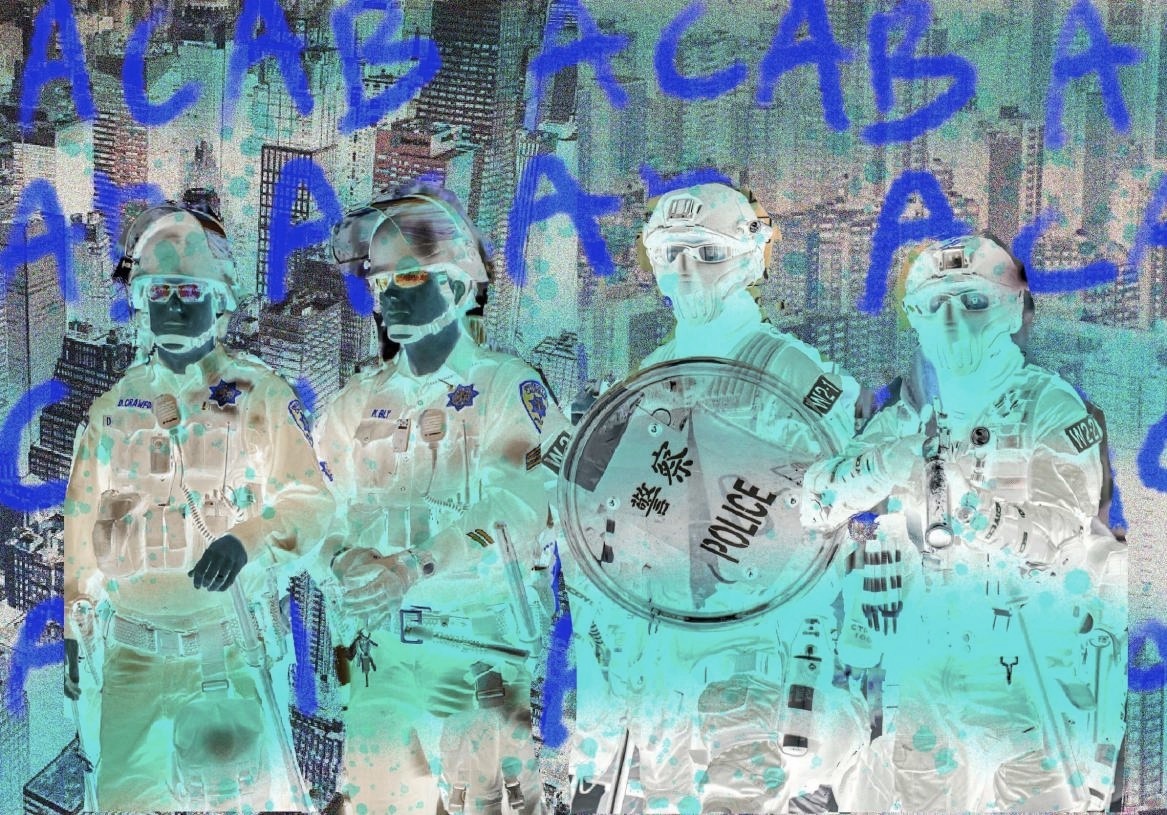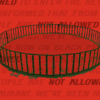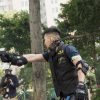Read this article in Chinese.
The US has erupted in protests after a white police officer in Minneapolis murdered George Floyd, a 47-year-old Black man. While Floyd’s death may have been the catalyst for this nationwide outrage, these protests point to a much older pattern of police officers murdering Black people across the country. But despite similarly being victims of police brutality, some Hongkongers have refused to stand with Black Lives Matter.
The oppression of Black people in the US is in a league of its own. That the officer who murdered Floyd was even charged is an anomaly and belies a harrowing reality: police officers murder hundreds of unarmed Black men every year. Even though 1 in every 1,000 black men can be expected to be killed by the police over the course of one lifetime, 99% of these killings result in the police officers walking free. The systemic nature of anti-Black racism is also evident in US incarceration rates. Black people are incarcerated at five times the rate of their white counterparts. In eleven states, 1 in 20 Black adult males is locked away in prison.
The US government’s response to these most recent demonstrations is equally telling. Despite gestures of solidarity from state officials and police officers, the state has responded with brutal violence. In the past six days alone, the US police have attacked over 100 journalists, used lethal arms against protesters, and have not hesitated to deploy the National Guard to over two dozen states. Cities around the country have announced curfews—some as early as 1pm— while shutting down public transport with only a few minutes’ notice, leaving countless working people stranded in the streets to be attacked by the police. President Trump, in his most recent announcement at the White House, has even threatened to bring on a “heavily armed” military to put an end to the protests.
Despite gestures of solidarity to BLM from US state officials and police officers, the state has responded with brutal violence.
Yet despite the severity of state violence in the US, the response from Hongkongers has been mixed. Some have shown solidarity by sharing protest resources, circulating tips to defuse tear gas, and educating each other on the systemic oppression of Black people in the US.1 Others have opportunistically taken advantage of the protests to draw attention to police brutality back in Hong Kong. But among them, some have hypocritically denounced the protests,2 and even called them “riots,” despite being fully aware of what such a designation could mean for those who get arrested.
These Hongkongers fuel an increasingly widespread belief that only the US government can stand against the Chinese Communist Party (CCP) and free Hong Kong from Beijing’s grip. By this flawed logic, supporting the US government is directly equivalent to resisting the CCP. To make matters worse, last week’s passage of the national security laws only exacerbated this tension, prompting Trump to declare the revocation of Hong Kong’s special trade status. While it still remains to be seen how this will play out, these Hongkongers are preparing to sacrifice themselves in this tit-for-tat battle between the two superpowers.
However, as militarized police brutality intensifies across the country, the Hong Kong movement’s alignment with right-wing US politicians is increasingly untenable. For the past year, Hongkongers have garnered support from the international community and placed their hopes on the US’s political system—especially right-wing politicians who’ve spoken strongly against police brutality in Hong Kong. In 2019, Republican Senator Tom Cotton repeatedly spoke against police violence in Hong Kong, praising protesters for standing against the “CCP’s tyranny.” Yet just days after unrest began on his home turf, he, like Trump, has already threatened to deploy military action.
The US is not the symbol of freedom, liberty, or democracy that these right-wing politicians profess it to be.
The two-faced support of Trump, Cotton, and a whole cohort of right-wing politicians must be a wake-up call for Hongkongers. The US is not the bastion of freedom, liberty, or democracy that these right-wing politicians profess it to be. Just as these politicians don’t care about Black lives, they don’t care about the lives of Hongkongers either. Instead, their support for the Hong Kong movement has always been contingent on their broader geopolitical goals and is as fickle as the whims of US foreign policy.
In truth, US support for Hong Kong was never meant to benefit the Hong Kong people. The city was only ever a way for the US to punish the CCP, even if it meant sacrificing it. Even though the US’s revocation of Hong Kong’s special trade status is meant to be a blow to the Chinese economy, it would almost certainly do the most harm to working-class Hongkongers.
But if there’s one thing that the US elites and the Chinese state has collaborated on, it’s suppressing grassroots movements. During the anti-ELAB protests, the US allowed its companies to export millions of dollars’ worth of riot-control military equipment to the Hong Kong Police Force (HKPF).3 This could mean that weapons used to oppress Hongkongers last year are the same ones used against US protesters today.
There’s a good chance that weapons used to oppress Hongkongers last year are the same as the ones used against Black Lives Matter protesters today.
To complicate Hongkongers’ position, the Chinese Foreign Ministry has condemned racism and state violence in the US. But its support for the Black Lives Matter movement is merely symbolic. Anti-Black racism is also rampant in Chinese society. During the COVID-19 outbreak, the CCP colluded in the harassment and displacement of African migrants in Guangzhou—a problem that has long predated the pandemic. African migrants in Guangzhou have also routinely protested state policing and surveillance. One time, they even surrounded a police station to protest the death of a Nigerian man during an immigration raid.
Furthermore, since the launch of the Belt and Road initiative, the CCP has committed to perpetuating the West’s colonial legacy in Africa. Through its state-owned firms in Africa that force low-wage Black workers to toil in dangerous conditions while extracting the countries’ resources, the CCP has also been complicit in the oppression of Black people around the globe. Despite the CCP’s ostensibly progressive trade deals and massive infrastructure developments in these regions, the benefits have not trickled down to everyday people. Instead, China’s deepening involvement in Africa only points to the establishment of a new imperial relationship built on a foundation of anti-Blackness.
The historical and political context of the protests in Hong Kong and Minneapolis may be worlds apart, but both stem from the same system of state violence and oppression. Indeed, global racial capitalism, the system that has ensnared Hong Kong between the two competing superpowers, is built on anti-Blackness. That is why Hongkongers must stand with Black Lives Matter: not just because our struggles appear similar but because our liberation as working people in this system of global capitalism is impossible without the liberation of Black people.
Whether or not the US can save Hong Kong is besides the point. Hong Kong may be locked in a geopolitical stranglehold, but at the end of day, Hongkongers must make a choice: stand with or against Black Lives Matter. It’s time to pick a side.
Footnotes
- This group have also been educating each other on the Black Lives Matter movement and anti-fascism.
- One of the five demands of the Hong Kong movement is to remove the “riot” designation.
- The Protect Hong Kong Act, which would prohibit the sale of some defense weaponry to the HKPF, has been stalled in Congress, meaning that these exchanges between the two police continue. (source)





